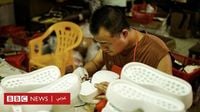As tensions rise between the United States and China over tariffs and trade policies, the impact on businesses and economies on both sides is becoming increasingly evident. Recent reports highlight how Chinese manufacturers are grappling with the consequences of steep tariffs imposed by the Trump administration, while also showing surprising signs of economic resilience.
According to a report by BBC News on April 16, 2025, many small Chinese companies have halted operations due to a staggering 145% tariff on all goods exported to the U.S. This has left products languishing in warehouses, waiting for a potential reversal of these tariffs. "Trump is a madman!" exclaimed Lionel Chaw, owner of Surbo Technology, whose company has seen nearly half of its products sold at Walmart in the U.S. Chaw expressed his anxiety about the future, stating, "This is very difficult. We feel very anxious; what if Trump doesn't change his mind? That will pose a threat to our factory."
Chaw's company, which employs around 400 workers in Dongguan, is not alone in this struggle. Nearby, a representative for a company selling ice cream machines noted, "We have already stopped production in practice. All products are available in the warehouses." This sentiment echoed throughout the Canton Fair in Guangzhou, where over 30,000 companies displayed their products over an area equivalent to 200 football fields.
The tariffs have significantly impacted the pricing of goods, making it difficult for American companies to absorb the costs. Economists predict that the trade war will ultimately affect American consumers, as they will have to pay higher prices for imported goods. The situation has prompted some Chinese manufacturers to explore alternative markets. Chaw remains hopeful that the tariffs will be lifted, saying, "Hopefully! Things will improve within a month or two. Hopefully, hopefully."
On the other hand, despite the challenges posed by the tariffs, China's economy has shown an unexpected growth of 5.4% in the first quarter of 2025, as reported by France 24. This growth is attributed to manufacturers who rushed to export their goods before the tariffs took effect. Sheng Laiyun, Deputy Director of the National Bureau of Statistics, stated, "Currently, imposing higher American tariffs than before has placed a limited damage on our foreign trade and our economy," while assuring that this would not alter the overall positive trend of the Chinese economy.
However, the Chinese economy is still facing significant challenges, including a real estate crisis and weak domestic consumption. The National Bureau of Statistics reported that the GDP reached 31,875.8 billion yuan, an increase of 5.4% year-on-year. The report emphasized the need for effective macroeconomic policies to stimulate growth.
As the trade war escalates, the U.S. has also faced its own economic pressures. President Trump initially imposed tariffs on Chinese imports due to accusations of their involvement in the production of counterfeit fentanyl. Since the start of 2025, tariffs on many Chinese imports have risen to 145%, with China retaliating by imposing 125% tariffs on U.S. imports.
Meanwhile, the tech sector is feeling the pinch as well. Nvidia announced that it would incur costs of $5.5 billion due to U.S. restrictions on the export of its H20 artificial intelligence chips to China, a crucial market for the company. These chips are essential for AI development, and the restrictions aim to maintain U.S. leadership in the AI race. Nvidia's stock fell approximately 6% following the announcement, indicating investor concern over the company's prospects in the face of these trade tensions.
Despite the setbacks, some Chinese companies are adapting by seeking new markets. One ice cream machine manufacturer expressed hopes of expanding into Europe and Saudi Arabia, while others are focusing on the domestic market. Mei Kunian, who runs a shoe company, reported earning around 10,000 yuan monthly from sales to Chinese customers, reflecting a shift in focus amid the trade war.
As the situation evolves, the long-term effects of the trade war remain uncertain. Economists warn that the U.S. may face economic stagnation as a result of these tariffs, while China grapples with the potential loss of a significant trading partner. The complexities of the trade relationship between the two nations continue to unfold, with neither side appearing ready for negotiations.
In conclusion, the ongoing trade war between the U.S. and China is reshaping the landscape for businesses and economies on both sides. While some companies are struggling to cope with the tariffs, others are finding ways to adapt and explore new markets. The resilience of the Chinese economy, despite the challenges, raises questions about the future of international trade and the potential for resolution in this escalating conflict.





